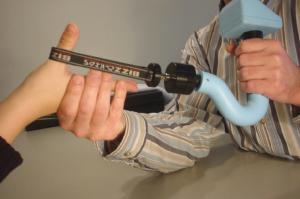
Study reveals accurate association between weak handgrip and a host of diseases among over-50s
Scientists demonstrate how a weak handgrip can accurately correlate with numerous diseases and poor performance of daily chores among older adults
SHARJAH, EMIRATE OF SHARJAH, UNITED ARAB EMIRATES, July 7, 2025 /EINPresswire.com/ -- Researchers have provided robust scientific evidence that ailments like depression, high blood pressure, diabetes mellitus, Alzheimer’s disease, osteoarthritis, and difficulties performing daily activities are associated with a frail handgrip, particularly among older adults.
The team, led by scientists from the University of Sharjah, says their study is the first large-scale investigation to present the prognostic efficacy of probable sarcopenia, the progressive loss of muscle strength among individuals over 50.
The scientists present their findings, which they claim accurately predict the correlation between several diseases and a frail grip, in the journal Aging Clinical and Experimental Research. (https://doi.org/10.1007/s40520-025-03007-6)
The data for the study is collected from the Survey of Health, Aging, and Retirement in Europe (SHARE), a large-scale European research project that studies individuals aged 50 and above. 17,960 community-dwelling geriatric adults aged 50 and over took part in the study and were monitored between 2025 and 2022.
The analysis of the data, they write, “exhibited significant prognostic accuracy for low HGS (Handgrip Strength) among men and women aged 60–79, irrespective of the quality of life, degree of depression, difficulties performing daily activities, and the presence of comorbidities, including depression, high blood pressure, diabetes mellitus, Alzheimer’s disease, and osteoarthritis.”
Doctors use handgrip strength tests to measure the strength or weakness of a person’s ability to squeeze or grip with their hands. It is a valuable tool to examine a person’s health conditions, particularly those of older adults. Medical professionals carry out these tests to predict potential health problems.
The authors acknowledge that previous studies present the predictive accuracy of the link between a poor handgrip and the development of several diseases, as well as conditions of daily life for older adults. However, they maintain that the findings in the plethora of available literature are drawn from “small subsets of hospitalized patients and were not replicated in community-dwelling older adults.”
The authors’ analysis is more comprehensive, covering a large community-dwelling population in residential settings, making it relevant to a variety of age-related lifestyle factors and comorbidities.
The authors’ investigation is not confined to health problems and diseases that can be associated with a weak handgrip. They also investigate their quality of life, several comorbidities, and difficulties performing daily chores.
They write, “We observed significant correlations between the CT ratio and handgrip strength in both men and women, regardless of BMI. This supports the general applicability of our findings across different segments of the population. The correlations were more robust in men than women of all age groups.”
BMI, or Body Mass Index, is a tool by which medical professionals measure body fat using height and weight as guidelines to determine whether an individual’s weight poses any health risks.
The authors add, “We report significant efficacy of CT ratio for probable sarcopenia in 17,960 community-dwelling older adults from 12 European countries. Specifically, the increasing CT ratio was associated with a higher risk and earlier onset of low HGS in the study population.”
The scientists demonstrate with “significant prognostic accuracy” that advancing age, male gender, higher than normal BMI, the presence of depression, and Alzheimer’s disease increase the risk of weakening an individual’s handgrip strength.
The researchers report statistically significant predictive accuracy between a low handgrip and the performance of everyday tasks and chores such as climbing stairs, getting dressed, and rising from a chair.
Men, more than women, according to the authors, develop a steeper decline in handgrip strength when reaching the age of 60 and above, coupled with a higher relevant risk threshold for mortality.
The authors’ study makes a valuable contribution to the literature, with several major strengths, namely their large representative sample drawn from 12 European countries.
Their longitudinal design, they wire, “significantly bolsters our confidence in the predictive efficacy of the CT ratio for low HGS. The standardized SHARE questionnaire, administered consistently across multiple European settings, ensured data harmonization and enhanced the study’s reliability.”
Their findings, the authors maintain, have clinical and policy implications that can help medical professionals to timely and accurately identify geriatric adults at risk of developing low handgrip strength.
They note, “Our findings have clinical and policy implications, potentially aiding healthcare providers and policymakers in identifying older adults with muscle weakness.”
LEON BARKHO
University Of Sharjah
+971 50 165 4376
email us here
Distribution channels: Companies, Education, Healthcare & Pharmaceuticals Industry, Science, World & Regional
Legal Disclaimer:
EIN Presswire provides this news content "as is" without warranty of any kind. We do not accept any responsibility or liability for the accuracy, content, images, videos, licenses, completeness, legality, or reliability of the information contained in this article. If you have any complaints or copyright issues related to this article, kindly contact the author above.
Submit your press release

